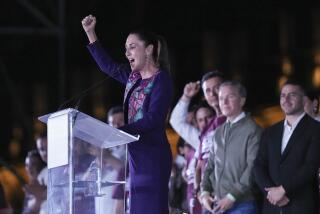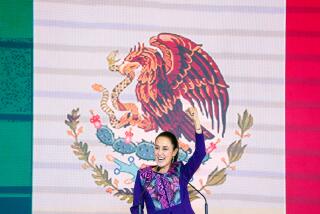Finally
It took a while, but Filipinos finally have the president they voted for in their Feb. 7 election.
Corazon Aquino, the most reluctant of politicians as well as one of the most courageous, is the new president of the Philippines--fairly chosen, duly sworn in, immediately recognized and promised support by the United States. The self-described simple housewife who was propelled into public life by the murder of her husband, Benigno, Ferdinand E. Marcos’ main political opponent, won her office after a people that at long last was given the chance to pass judgment on the 20-year-long Marcos regime did so with clarity and passion.
Election was not enough. Aquino and her forces also had to fight to secure the prize that was theirs after Marcos crudely sought to appropriate it in yet another act of grand theft. Day after day, peacefully but implacably, the anti-Marcos demonstrations went on. Last weekend came the denouement. Lt. Gen. Fidel V. Ramos, a professional soldier untainted by the corruption that had become pervasive in the military, broke with the regime and demanded that Marcos resign. He was joined by Defense Minister Juan Ponce Enrile, long a faithful Marcos lieutenant, more recently--very recently--a man who found his conscience disturbed by the depredations of the Marcos regime.
The Ramos-Enrile defections provided a rallying point for an extraordinary and remarkably unviolent revolutionary display of opposition to the regime and, in a matter of days, assured its fall. Whether violence can continue to be held in check is an open question. The loyalties of some military units may still be in doubt. The frustrations and furies of a populace that has long suffered repression and economic exploitation could well seek outlets in private vengeance and pillage. Certainly the influential Roman Catholic Church, whose firm voice in behalf of political morality proved so important, will appeal for order and the rule of law. So will President Aquino.
The United States, bound by historic, cultural and strategic ties to the Philippines, can be said to have acted responsibly if not always thoughtfully through the crisis. After President Reagan’s press conference blunder that seemed to suggest tolerance of the rigged election results, policy lines became clear and proper. Marcos was given to understand that he had lost American support and that his safe departure and exile could be guaranteed only if he did not try to fight to hold on. Now Washington is hailing the reestablishment of democratic rule in the Philippines. It is up to Filipinos to make that democracy work. And it is up to the United States, whose long record of support for Marcos many in the Philippines won’t soon forget, to do everything possible to abet that effort.
More to Read
Sign up for Essential California
The most important California stories and recommendations in your inbox every morning.
You may occasionally receive promotional content from the Los Angeles Times.










